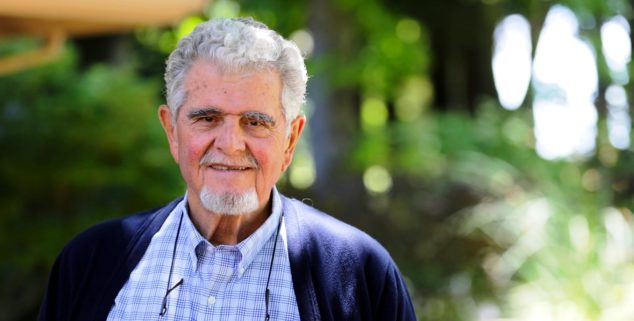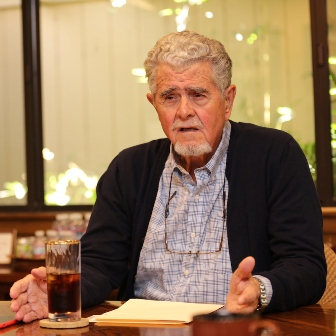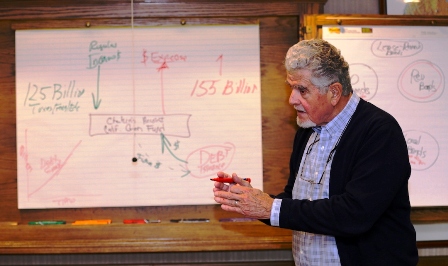News
Proposition 53: A battle over debt
 Stockton businessman Dino Cortopassi, who is financing Proposition 53 on the Nov.8 ballot. (Photo: Scott Duncan, Capitol Weekly.)
Stockton businessman Dino Cortopassi, who is financing Proposition 53 on the Nov.8 ballot. (Photo: Scott Duncan, Capitol Weekly.)He started out with $3,000 and a VW bug. Now, he’s a multimillionaire bankrolling a November ballot initiative to dramatically change the way California borrows money for public works.
Dean “Dino” Cortopassi, 78, is a Stockton landowner, farmer and businessman who has waged a crusade against pervasive government debt and, he says, the dubious accounting tricks that allow it to flourish.
“What I’m about is not taxes,” the 6-foot-2 Cortopassi said in an interview in his north Stockton office, “but I do understand arithmetic. This is about debt and the bills you don’t pay.”
About 5 percent of his income comes from the delta, Cortopassi says, and Proposition 53 “isn’t only about the delta.”
By turns genial and blunt-spoken, Cortopassi uses easels and colored markers to sketch his arguments. He paces around the office as he makes his points, reminiscent of a professor at a seminar. His office and home are part of a compound surrounded by an orchards largely invisible from the road. The long, narrow driveway, flanked by trees, cautions visitors to drive slowly because children are playing – a reference, perhaps, to his 10 grandchildren.
His fundamental message: Spiraling debt cripples public resources, falls disproportionately on those who can afford it least, reflects a lack of political leaders’ discipline and hurts future generations.
“It’s not about the funding, it’s about the debt,” he said.

Dean Cortopassi (Photo: Scott Duncan)
His foes say it’s not about debt at all, but about thwarting the Brown administration’s $15 billion twin tunnel’s project to convey water through the Sacramento-San Joaquin River Delta, an allegation Cortopassi rejects. About 5 percent of his income comes from the delta, he says, and Proposition 53 “isn’t only about the delta.”
Cortopassi has put $4.5 million of his own money into Proposition 53, which would force any state public works project financed with $2 billion or more in revenue bonds to go to the people for a vote.
State revenue bonds currently do not require a public vote because they are paid off by the fees and charges generated by the project itself, such as a water system. But Cortopassi said those fees and charges ultimately fall on the public.
If people are going to bear the brunt of the costs of a public project, he argues, then why shouldn’t they have a say in deciding whether to build them?
His measure, called “Stop Blank Checks,” is pegged to inflation, and doesn’t apply to local projects or those of the University of California. But it does apply to so-called joint-powers authorities, or JPAs, which typically seek to finance big projects with a mix of funding. Two examples: The efforts to finance new reservoirs at Temperance Flat and Sites.
On a ballot teeming with provocative propositions — marijuana legalization, tobacco taxes, condoms for porn actors, school funding, criminal sentencing — a measure targeting “revenue bonds” doesn’t sound all that exciting.
But it is.
Political strategists have described it as the “sleeper initiative on the ballot” because, thus far, it has been overshadowed by the other measures facing voters.
Among other things, revenue bonds have financed roads and highways, and UC, CSU and state water projects, including some $10 billion at the Department of Water Resources.
Powerful interests have joined to block Proposition 53, including the state Chamber of Commerce, which represents business interests, and the State Building and Construction Trades Council, or BCTC, which is affiliated with unions whose workers handle major construction projects, such as the $68 billion bullet train and the $15 billion twin-tunnels project in the delta. Both groups routinely play a major role in California elections.
“What’s the problem with the existing law?” said Chamber President Allan Zaremberg. “I don’t see anyone complaining that revenue bonds are an issue in their community or the state.”
Despite Cortopassi’s emphasis on debt, the delta project is driving the measure, “you wouldn’t even see this on the ballot if the governor didn’t have the conveyance project,” he said. Requiring statewide vote on a local project such as Sites reservoir, means you “would have to convince someone who is 400 miles away that this is in their best interest,” he added.
State Treasurer John Chiang, the state’s top fiscal officer who administers state borrowing, says Proposition 53 could damage the state’s credit rating and make it harder “to issue revenue bonds to build roads, schools, sewage plants and other critical public works.”
Thus far, Proposition 53 opponents have raised about $425,000. But that figure certainly will rise, given the unusual, A-list opposition lineup.
Among other things, revenue bonds have financed roads and highways, and UC, CSU and state water projects, including some $10 billion at the Department of Water Resources, Chiang testified at a legislative hearing.

Dean Cortopassi at the easel. (Photo: Scott Duncan)
Foes hope Gov. Jerry Brown, who opposes Proposition 53, will spend some of his $20 million in campaign funds to block Cortopassi. The Democratic governor says Proposition 53 “threatens the economic well-being of Northern California in a very profoundly serious way.”
But the governor’s campaign firm, SCN Strategies, says he hasn’t signaled his intentions. And Brown has his own parole-reform initiative to worry about, Proposition 57, which is drawing opposition. Brown’s former cabinet secretary, Dana Williamson, left the administration to be a private political consultant and is involved in both campaigns.
Thus far, Proposition 53 opponents have raised about $425,000. But that figure certainly will rise, given the unusual, A-list opposition lineup: Brown, the Chamber and the BCTC.
BCTC President Robbie Hunter sees Proposition 53 as “a new tactic, but part of the same old war by extremists to protect and expand the wealth and power of the super rich, and make working people pay the price.”
Cortopassi isn’t buying any of it.
He believes California’s public debt – about $340 billion by one estimate – has expanded exponentially because of poor management and the lack of public awareness.
“Don’t drink the political Kool-Aid!” he tells a reporter.
“People are starting to wise up. People should have the choice of voting on a revenue bond.”
—
Ed’s Note: Corrects age to 78 in 2nd graf.
Want to see more stories like this? Sign up for The Roundup, the free daily newsletter about California politics from the editors of Capitol Weekly. Stay up to date on the news you need to know.
Sign up below, then look for a confirmation email in your inbox.

The strategists are right to be careful about too many messages. If voters throw their hands up and vote no on everything – as many do when they get overwhelmed – this puts a drag on many of the initiatives. Ironically though, voting no on everything may be the only way to get the legislature legislating again.
My question is how much money Cortopassi is receiving in agricultural and environmental subsidies from the government. He is listed in at least one database. Congress changed the law so you can’t easily get the information, but I would not be surprised to find out the twin tunnels would cost him government checks.
What does he farm in the Delta? Only crop in California that has a subsidies is cotton and I have never seen cotton in the Delta.